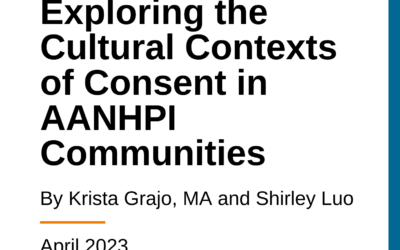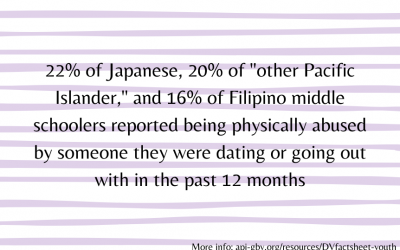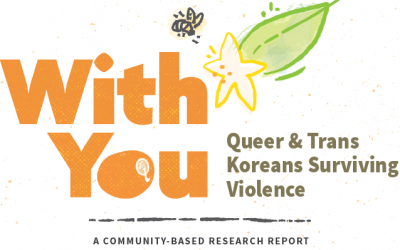Dating Abuse and Sexual Assault among Youth and Teens
47% of women and 39% of men who’ve experienced rape, physical violence, or stalking by an intimate partner first experienced it between 18-24 years of age
CDC: National Intimate Partner and Sexual Violence Survey, 2010
Influence of popular culture on teen and adolescent relationships
Popular culture, fueled by media like TV, movies, and music, normalizes violence or toxic behavior in relationships. It romanticizes tumultuous relationships, makeup/breakup cycles, explosive arguments, “take charge” male partners, and jealousy or obsession. In comparison, more mundane and unremarkable relationships appear cold and passionless. This is common in not only mainstream U.S. media but also in ethnic media frequently enjoyed by Asian youth, such as Korean/K-drama, Chinese/C-drama, Bollywood movies. While these relationship dynamics may not be intrinsically problematic, teens who learn to hold them as the hallmarks of passion and love are less likely to spot the red flags of a controlling relationship, and to be able to draw healthy boundaries.
Note on terminology
Today’s youth are increasingly using informal terms to describe romantic or sexual relationships. Just like the relationships they represent, these terms can be fluid or lack discreet definitions. Some include:
- Hooking up
- Dating
- Friends with benefits
- Seeing each other
- Situationship
- Just talking
- Just friends
Although we use terms like “dating violence,” “partner abuse,” or “domestic violence” for convenience, abuse can happen in any relationship, regardless of whether it is exclusive, “official,” or sexually intimate.
Asian and Pacific Islander Youth
Although all youth are vulnerable to relationship abuse, culture and community norms common in Asian and Pacific Islander households can impact or exacerbate abuse experienced by API youth. These dynamics can include:
- Parents not outwardly expressing love or discussing healthy relationships or sex with children
- Children witness controlling behavior or abuse between parents: based on our review of several studies, 21-55% of Asian women report intimate partner physical and/or sexual violence
- Verbal abuse and corporal punishment like spanking or ear pulling is common and minimized
- Patriarchal norms such as deference to male children/male head of household, or demanding obedience in girls
- Teens, sometimes even college-age children, are forbidden to date
- Lack of acceptance or understanding of children’s sexual orientation or gender identity
- Aversion towards discussing topics like dating, sex, and family issues with others, even therapists or professionals, because they are perceived to be private
- Mental illness, depression, and anxiety are stigmatized. Some parents or adults may believe that conditions like depression or anxiety do not exist or can be easily overcome
For API youth, this could mean:
- Lack of healthy relationship role models means less ability to spot red flags in relationships
- Minimizing physical violence, or seeing it as somewhat normal in a relationship
- Youth do not have an adult family member they can turn to for guidance, because they are not comfortable discussing relationships or sex, or they are afraid to tell their parents about being in a relationship
- Youth, in particular LGBTQ youth or those experiencing mental illness or depression, feel isolated. Abusive partners can, in turn, leverage these feelings of isolation
- Learned gender expectations, such as modesty in girls, can cause increased feelings of shame or guilt after experiencing sexual assault
- Cultures of silencing make it less likely that survivors will reach out for help
- Although rates of limited English proficiency are lower among API youth than in older generations, for those who face language barriers, lack of multilingual counseling/support resources in schools can be isolating
Related Resources
Connected and concerned: Online sexual harassment of teenagers of Asian descent on dating platforms
February 29, 8am HST/11am PST/1pm CST/2pm ESTGenerative AI, with its ability to create morphed photos and deepfakes, is negatively impacting teenagers, especially female teenagers of Asian descent, online and influencing their identity in digital spaces. This...
Exploring the Cultural Contexts of Consent in AANHPI Communities
AANHPI communities tend to be collective in nature, as well as hierarchical, to varying degrees. Both contexts complicate the concepts of consent and boundaries, especially for AANHPI youth and young adults, who often do not have opportunities to learn about the taboo...
Centering AANHPI Survivors: Recommendations for Campus and Title IX Administrators
This summary report lifts up the experiences and needs of Asian, Asian American, Native Hawaiian, and Pacific Islander students and staff who face dating and domestic violence, sexual assault, or sexual harassment on campus. While focused on experiences of survivors on college campuses, the findings and recommendations may also have implications for AANHPI students in the context of K-12 schools. Many thanks to the AANHPI survivors and advocates who were willing to share their experiences and insists with API-GBV!
Webinar for Advocates and Adult Allies! Sexual Harassment & AAPI Teens
Do you know what signs to look for and what steps to take if a teen or young adult encounters sexual or other harassment in the workplace? At the EEOC, we have seen that young workers at their first jobs can be especially vulnerable to harassment whether due to sex, national origin and other characteristics. Make a difference in the lives of the Asian and Pacific Islander teens and young adults you serve by learning how to recognize and refer cases, and understanding the role you can play to address workplace sexual harassment.
Presented by EEOC San Francisco. Hosted by API-GBV.
Factsheet: Dating/Hookup Abuse and Campus Sexual Assault among Asian and Pacific Islander Youth
A collection of information and statistics on dating abuse and sexual assault affecting API teens and youth
With You: Queer and Trans Koreans Surviving Violence: A Community-Based Research Report, 2018
By the Korean American Coalition to End Domestic Abuse
This report is an effort to document and reflect on the experiences of queer and trans Korean survivors of family or intimate partner violence. It shares key findings of the Queer & Transgender Korean American Survey on Family and Intimate Partner Violence in Our Community, as well as two in-person focus groups.
Hotlines
Love is Respect youth hotline
1-866-331-8453 | Text ‘loveis’ to 1-866-331-9474 or online chat
National Domestic Violence Hotline
1-800-799-7233 or online chat
RAINN sexual assault hotline
800-656-4673 or online chat
Other Resources
Break the Cycle: inspires and supports young people to build healthy relationships and create a culture without abuse
Center for Changing our Campus Culture: directory of national organizations dedicated to ending sexual assault on campus
End Rape on Campus: works to end campus sexual violence through survivor and community support, prevention through education, and policy reform
Start Strong, a project of Futures Without Violence: a resource campaign for those working with teens on dating violence prevention
HEART Women & Girls: ensures that all Muslims have the resources, language, and choice to nurture sexual health and confront sexual violence
It’s On Us: a national movement to end sexual assault on college campuses
Know Your IX: a survivor- and youth- led project empowering students to end sexual and dating violence in schools





